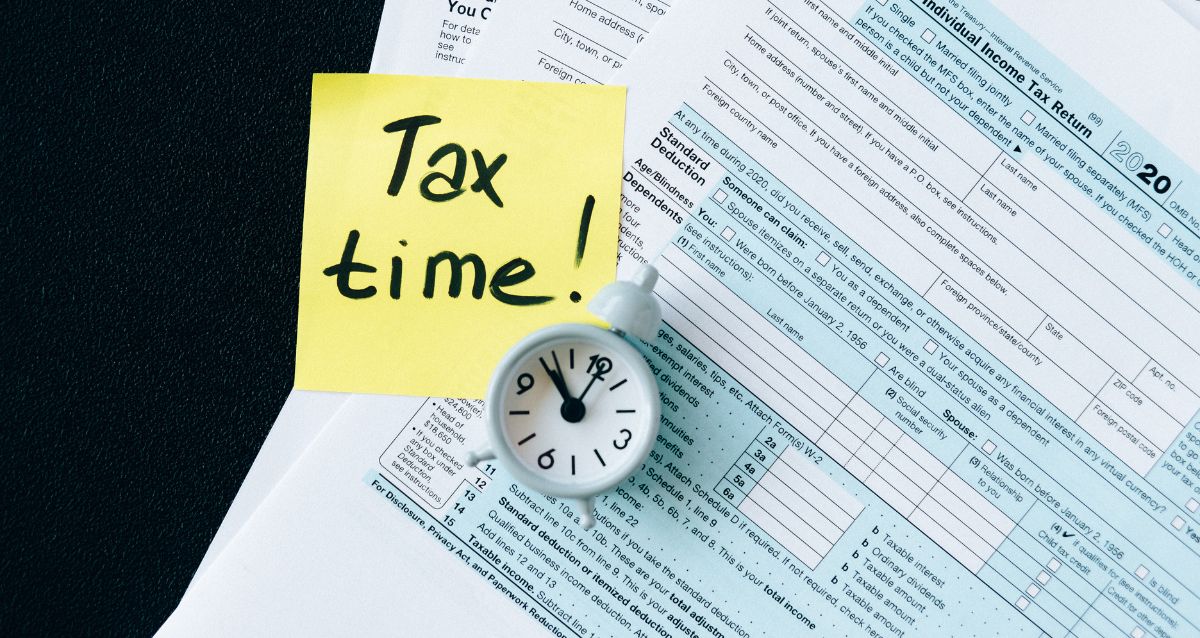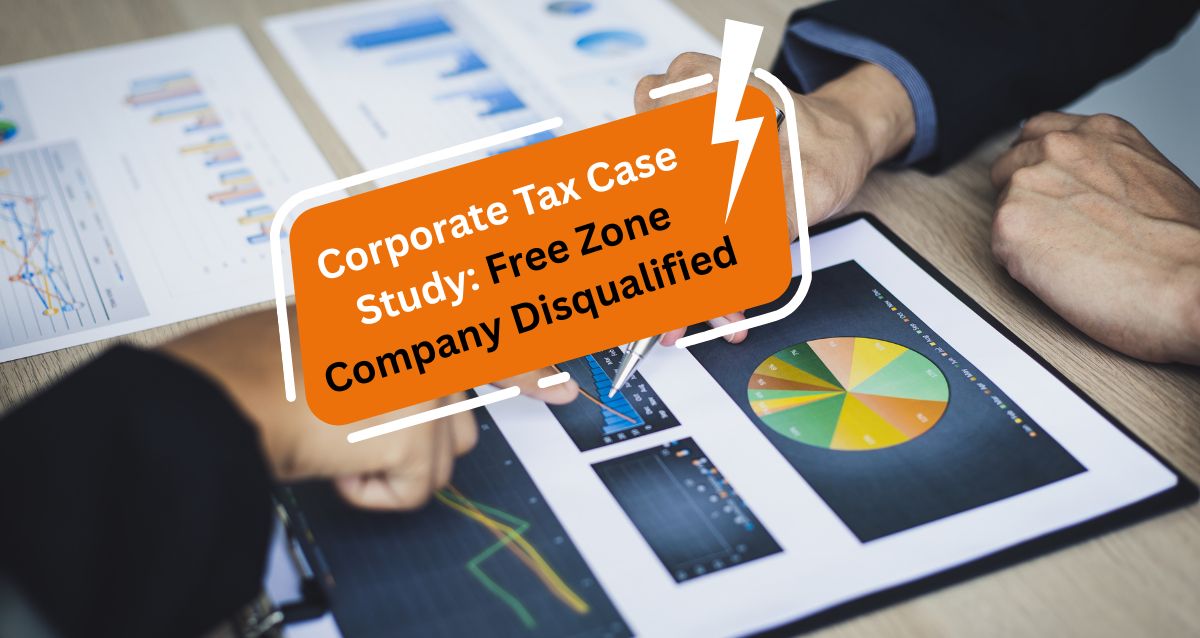Disqualification of Free Zone Company Explained
Before starting the article, please note that the company name used in this example is fictional and is provided for illustrative purposes only.
You must have heard about Free Zone Company 0% in Corporate Tax, Qualifying income is taxed at 0%, Income from Qualifying Activities are taxed at 0%, etc. Many investors and senior management repeat this question in the market, being in the Free Zone, are we automatically eligible for 0% Corporate Tax? The straight answer is no. There are conditions attached to get the eligibility of 0% Corporate Tax in the UAE for Free Zone companies.
In this case study, we are going to discuss a common pitfall for Free Zone companies who structured their business to get 0% Corporate Tax and the loose end was not satisfying the de minimis threshold, which resulted in losing the Qualifying Free Zone Person status. A Free Zone company gets income which is not eligible for 0% Corporate Tax (e.g., Income from Excluded Activities) and such income exceeds the de minimis threshold, the free zone company loses the status of Qualifying Free Zone Person in the year of violation and the subsequent 4 years.
Background of the Company
Company Name: MediCare Devices FZ-LLC
Free Zone: Sharjah Healthcare City
Business Activity: Distribution of medical equipment and supplies
Annual Revenue (FY 2024): AED 7.5 million
Employees: 10 (sales team, warehouse staff, and admin personnel)
Clients: Hospitals and clinics located both in Free Zones and the mainland UAE
MediCare Devices FZ-LLC is a registered Free Zone company engaged in the import, storage and distribution of healthcare devices. The major clients of the company are located within the Free Zones, whereas a few clients are located outside the Free Zone jurisdiction, in the mainland. Thus, the MediCare Devices FZ-LLC generated income during the year 2024, a combination from other Free Zone and mainland healthcare providers.

Objective
The company reached out for clarification on:
- Being a Free Zone Distributor, whether their revenue from the mainland hospital is eligible for 0% Corporate Tax or will it impact their 0% Corporate Tax status.
- Being a Free Zone company, getting main income from other free zone companies and a lower portion of revenue from mainland customers, requires paying Corporate Tax on the profit generated from mainland customers only or not.
- What is the de minimis threshold, and how is it calculated?
- What activities are excluded activities and whether their business activities fall under the definition of excluded activities.
- What steps can they take to mitigate the tax exposure and structure their business for future years in a tax-optimised way?
Legal Framework and Clarification
There is a combination of Articles and Decisions involved in the determination of Qualifying Free Zone Person and Qualifying Income. Article 18 of UAE Corporate Tax Law, Cabinet Decision No.100 of 2023, Ministerial Decision No.265 of 2023 which followed by FTA's Corporate Tax Guide for Free Zone Persons (CTGFZP1) have collectively given a clear guidance for a Free Zone company to be followed in order to be eligible for 0% Corporate Tax. A Free Zone Person can avail the benefit of 0% Corporate Tax on Qualifying Income, and such incomes which are relevant to this case study are:
- Income generated from other Free Zone companies, as long as the recipient of goods or services is the beneficial recipient and the business activities are not considered as excluded activities.
- Income generated from non-free zone companies (Mainland and Foreign) as long as their business activities fall in the list of Qualifying Activities and do not fall under the Excluded Activities.
- Non-Qualifying Income generated by the Free Zone Company and such income satisfies the de minimis threshold conditions. This condition states that the non-qualifying income must be below in a tax period:
- 5% of the total revenue or;
- AED 5 Million
Read More about Legal Requirements for a Free Zone company to make sure that the conditions are satisfied to get 0% Corporate Tax
Revenue Breakdown and Analysis
As of the date of the end of the tax year, 31 December 2024, MediCare Devices FZ-LLC's revenue break-up was as follows:
- Earned AED 6.9 Million from Free Zone Clients.
- Earned AED 600,000 from mainland healthcare service providers and clinics.
Analysis
As per the Cabinet Decision No.100 of 2023, the income generated from other Free Zone Health Care Service Providers and Clinics can be considered as Qualifying Income since they are the beneficial recipients of the device supplies by MediCare Devices FZ-LLC.
On the other hand, the income generated from Mainland customers is not considered as Qualifying Income. Thus, the revenue is considered as Non-Qualifying Income.
De Minimis Test and result:
- Total Revenue in the year 2024 AED 7.5 Million (AED 6.9 Million and AED 600,000)
- Non-Qualifying Revenue AED 600,000
- % of Non-Qualifying Revenue 8%
- De Minimis Test Failed?

Consequences
As a result, MediCare Devices FZ-LLC:
- Not eligible to opt for the status of Qualifying Free Zone Person for the tax year 2024.
- Considered as an entity that is subject to tax as per the standard rates of 9% on the taxable income that exceeds AED 375,000.
- Ceased to be eligible for the status of QFZP for the next 4 tax periods, which resulted in the loss of Qualifying Free Zone Person status for a total period of 5 years.
This disqualification significantly impacted the company's tax position, especially as the volume of mainland transactions was relatively low compared to overall revenue.
Even though the income generated from Mainland customers is low compared to the overall income, the understanding of low and mitigating it in a tax-optimised method resulted in 9% Corporate Tax for MediCare Devices FZ-LLC for their taxable income.
Lessons and Insights
1. Revenue Source Matters: The Corporate Tax implication for the company can entirely change based on the revenue source and the location of customers.
2. De Minimis Rule is Strict: De Minimis Rule is stringent. Exceeding the limit of 5% of AED 5 Million slightly can also have an impact with huge tax implications.
3. Excluded Activities are Broad: Even if the transactions with customers in the mainland are core to the business model, the income can be considered as Non-Qualifying Income for Corporate Tax purposes.
4. Five-Year Lockout: Even if the Free Zone company restructures the business after failing the conditions to become a Qualifying Free Zone Person, the eligibility is blocked for 5 years without any exceptions.
Recommendations for Similar Businesses
Review Client Base Annually: Ensure non-qualifying income, like income from non-free zone companies, is under the allowable limit of de minimis.
Restructure Sales Channels: Sales channels can be restructured for onshore business activities through a branch in the mainland. In this case, the income generated by the mainland branch is considered as Excluded Income and only income attributable to the mainland branch is subject to tax at 9%, whereas such income is not considered for de minimis calculation.
Monitor De Minimis Thresholds: Keep a real-time track of Excluded Activity revenue to avoid accidental disqualification.
Seek Advance Clarifications: Engage with tax advisors early to determine the risk level based on proposed contracts. Engage with FTA-registered Tax Agents, like Flying Colour Tax Consultant, to determine the risk level on the proposed contracts.
How Flying Colour Tax Consultant Can Help?
Our Corporate Tax advisory team assists Free Zone companies in:
- Evaluating Qualifying Free Zone Person status and eligibility
- Segregating Qualifying vs Excluded Activities
- Implementing internal controls for compliance
- Reorganising legal structure to maintain tax efficiency
To learn more about Corporate Tax Case Study: Disqualification of a Free Zone Company Due to Excluded Activities, book a free consultation with one of the Flyingcolour team advisors.
Disclaimer: The information provided in this blog is based on our understanding of current tax laws and regulations. It is intended for general informational purposes only and does not constitute professional tax advice, consultation, or representation. The author and publisher are not responsible for any errors or omissions, or for any actions taken based on the information contained in this blog.


